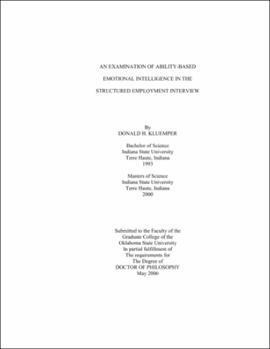| dc.description.abstract | Purpose and Method of Study: Research on emotional intelligence (EI) is gaining momentum and becoming one of the most topical areas of organizational research. Of particular interest is the role of EI in the context of employment selection and job performance. Due to the degree of social interaction and emotional influence, the employment interview appears to be an ideal context in which to study the role of EI. The goal of this research is to determine the effect of ability-based EI in the situational interview (SI), the behavioral descriptive interview (BDI), and on the job. More specifically, does EI predict SI ratings, BDI ratings, and job performance after controlling for the established correlates of "g" and the Big-5? Furthermore, the four dimensions of EI are modeled for their prediction of the three dependent variables and to examine gender interactions. In both a pilot study and a field sample, participants were assessed with the MSCEIT, the Wonderlic Personnel Test, the NEO-FFI, and participated in a video recorded job interview. This interview consisted of a situational interview component and a behavioral descriptive interview component. The video recorded interview was later split into separate SI and BDI interview segments and was evaluated by trained raters. Job performance was assessed by the supervisor of the participant. Findings and Conclusions: Results indicate that two EI dimensions, the understanding and managing emotions dimensions, predict situational interview ratings, even after controlling for "g" and the Big-5. Overall EI and the managing emotions dimension of EI significantly predict job performance in both the pilot study and the field sample. After controlling for "g" and the Big-5, the managing emotions dimension of EI predicts 4% of the variance in job performance in both samples. Gender did not interact with EI to the degree expected, though a few gender interactions were found. This study is one of the first to evaluate ability-based emotional intelligence in an actual field setting, one of the first to evaluate ability-based EI in relation to actual job performance, and is the first to evaluate ability-based EI in the structured employment interview. | |
